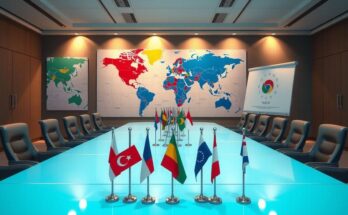The approaching political landscape in Mozambique reveals ongoing challenges stemming from its civil war, with Frelimo’s recent elections raising concerns over legitimacy and governance. Despite significant economic growth and peace agreements, tensions with Renamo persist, highlighted by the insurgency in Cabo Delgado and allegations of electoral misconduct. The nation continues to navigate complexities relating to political representation and economic disparities that hinder equitable progress.
The multiparty elections held in October 1994 marked a significant milestone in Mozambique’s quest for peace after years of civil strife between the ruling Frelimo party and the opposition Renamo. Following detailed negotiations, both parties made substantial compromises; Frelimo transitioned from one-party to multiparty politics, and Renamo rebranded itself as a legitimate political entity under the leadership of Afonso Dhlakama. The international community played a crucial role, with the United Nations overseeing election conduct, leading to an outcome deemed free and fair, resulting in Frelimo retaining power but sharing representation with Renamo in the government.
The newly formed government faced substantial challenges stemming from the civil war, including the presence of land mines and issues related to the demobilization of ex-combatants. A series of natural disasters further complicated matters in the early 21st century, though the nation’s economy began to recover, bolstered by reformed economic policies and foreign investments in natural resources.
Mazambique’s political landscape remained tense, as feelings of inequality and fears of marginalization sparked renewed conflict between Frelimo and Renamo, culminating in a resurgence of violence as Renamo withdrew from the peace agreement in 2013. However, a new agreement was reached in 2014, leading to contested elections where Frelimo’s candidate, Filipe Nyusi, succeeded albeit with reduced legislative support.
Following further tensions and military confrontations in subsequent years, Renamo’s leadership changed with Ossufo Momade succeeding Dhlakama after the latter’s death in 2018. Peace negotiations continued, and a significant agreement was signed in 2019, setting the scene for a period of relative calm leading to another election.
Despite these varying dynamics, Mozambique confronted additional challenges, including an emerging humanitarian crisis from an insurgency in Cabo Delgado linked to Islamic State affiliates. Coupled with significant electoral allegations of misconduct and violence surrounding the 2024 elections, the political climate remains precarious, with each development contributing to the broader narrative of Mozambique’s ongoing struggle for stability and governance.
Mozambique’s journey towards peace and stability has been marked by a protracted civil war fueled by tensions between the Frelimo and Renamo political factions, culminating in a pivotal peace agreement in 1992. The transition to a multiparty system was facilitated by international support and significant structural reforms within the nation’s governance framework. Despite these efforts, political strife has persisted, manifesting in renewed violence and a series of contentious elections, indicating ongoing challenges to the rule of law and governance standards that threaten the hard-won peace.
In conclusion, Mozambique’s narrative reflects the complex interplay of political reform, economic challenges, and external influences shaping its post-war trajectory. The succession of elections, marked by significant involvement from both local factions and international actors, underscores perpetual tensions in political representation and governance accountability. The outlook remains uncertain as emerging crises and discontent threaten to undermine the pursuit of lasting stability and progress for the Mozambican people.
Original Source: www.britannica.com




